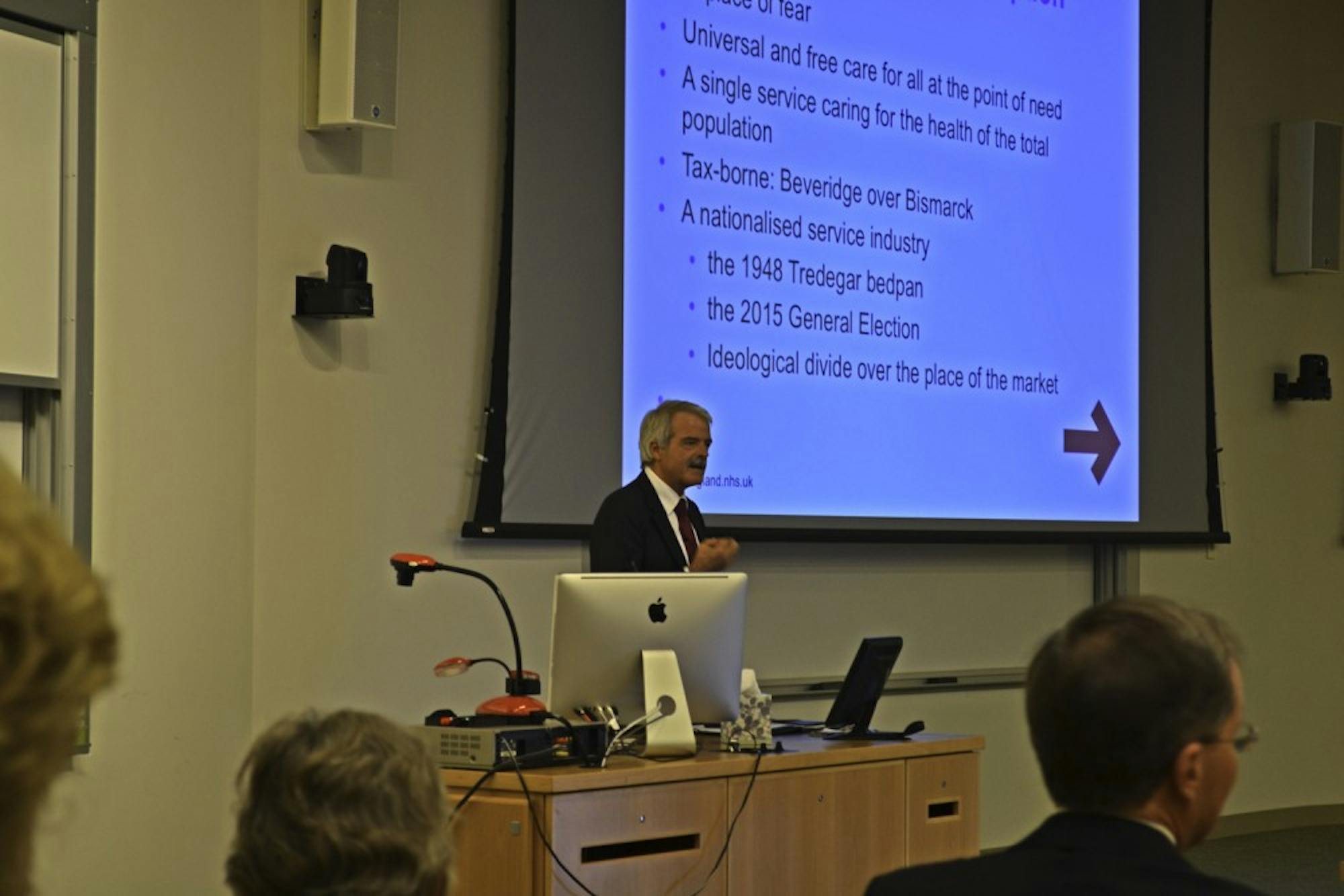Despite the United Kingdom health system’s high patient satisfaction ratings — based on factors like short waiting times, comprehensive use of electronic medical records and universal access to health care — the system’s outcomes are not as good as they should be, said Sir Malcolm Grant, chair of England’s National Health Service and the College’s current Montgomery Fellow.
Grant spoke to an audience of around 150 people on Tuesday afternoon about the future of England’s health care system. He discussed future problems that the NHS will face, from budgetary constraints to an aging population, and the strategies the organization is developing to address them.
Relative to the rest of Europe, the U.K. has a higher premature mortality rate and a growing proportion of citizens with disabilities, he said.
“The National Health Service hasn’t been a health service at all — it’s been a disease-fixing service,” Grant said. “It’s quite a dysfunctional model.”
The U.K. faces major public health problems like high levels of smoking, alcohol consumption and obesity. Grant said “real incentives” must help people understand the benefits of a healthy lifestyle.
Grant spoke of the NHS’s long-term goals, which center around adapting to a changing social and economic climate. The board needs to increase the current system’s efficiency while reducing expenditures. The NHS has a budget of nearly 100 billion pounds, he noted.
Though the NHS’s model has not changed significantly since it was implemented in 1948, Grant said the organization must adapt to the field’s modern complexity and patients’ demands for quality health care.
Grant described a new model of enhanced primary care that would allow patients to access specialists as well as general practitioners in central multi-specialty centers, decreasing hospital admissions.
“We are willing to learn from any system in the world that can demonstrate high-quality care for patients,” he said.
The NHS looks to take advantage of the high level of scientific achievement at institutions like University College London, of which Grant was president and provost for 10 years. Projects like the “100,000 Genomes Project,” an effort to sequence the genomes of 100,000 people, will give the medical community access to big data that could revolutionize health care.
He was knighted in 2013 for his services to higher education, and has a background in planning, environmental and property law.
Parliament appointed Grant as the inaugural chair of NHS England, an organization responsible for overseeing the NHS and managing the quality of health care for a population of 55 million people.
Grant was nominated for the fellowship by four different departments at Dartmouth: The Dartmouth Center for Health Care Delivery Science, the Dickey Center, Tuck School of Business and the Rockefeller Center.
Albert Mulley, director of The Dartmouth Center for Health Care Delivery Science, first suggested nominating Grant after they met through Dickey board member Jon Zehner ’79.
“Somebody who has had such achievement in higher education who stepped into the challenge of getting health care right at a time when it’s a global challenge seemed like someone we could learn a great deal from,” Mulley said.
Grant’s schedule consists of meetings with faculty and the Rockefeller Leadership Fellows, Tuck students, Dickey Center Great Issues Scholars and members of the Global Village living-learning community. Grant will be on campus until Oct. 24.
Harle and Kenneth Montgomery ’25 created the program in 1977 to bring inspiring and creative individuals to campus to interact with students. They created the endowment and purchased Montgomery House for fellows to live in while they are on campus, anywhere from days to a year.
The program has since brought more than 200 fellows to campus.
“Their idea was that the best complement to the Dartmouth education was an opportunity to meet people that were out in the world doing interesting things and to get to know them as people,” program director Christianne Wohlforth said.
Last winter, there were no fellows in residence, so Wohlforth instead held focus groups to assess the program and determine ways to widen its reach.
“It was a good opportunity to do a lot of listening with students about the kinds of things they cared about that are related to the program,” Wohlforth said.
During the discussions, the 25 attendees expressed a desire to interact with younger and more diverse fellows, as well as individuals representing specific fields like technology and health care, Wohlforth said.
Students can nominate fellows, but Wohlforth said informal suggestions from students are more common, as the nomination process is fairly extensive.
“Students really want to hear from people who might speak to their own experiences,” she said. “Those are harder things to implement right away, but when I look forward at the fellows that we have coming up, I think we’re doing a better job of it.”
Future fellows include Bernardine Evaristo, a writer who will teach a creative writing course in the spring; Enrique Martinez Celaya, who will return in the summer to work on a commission for the Hood Museum of Art; actress, playwright and professor Anna Deavere Smith and The New Yorker’s Hendrik Hertzberg, both arriving next fall.
Photographer Emmet Gowin was this term’s first Montgomery Fellow, arriving on Oct. 5.
This article has been revised to reflect the following correction:
Correction appended (Oct. 22, 2014):
Grant noted that the NHS has a budget of nearly 100 billion pounds, not 100 million pounds, a mistake made due to an editing error.




